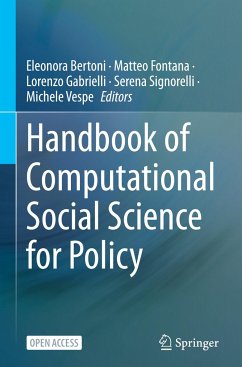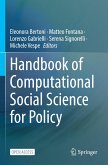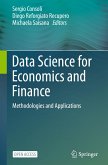This open access handbook describes foundational issues, methodological approaches and examples on how to analyse and model data using Computational Social Science (CSS) for policy support. Up to now, CSS studies have mostly developed on a small, proof-of concept, scale that prevented from unleashing its potential to provide systematic impact to the policy cycle, as well as from improving the understanding of societal problems to the definition, assessment, evaluation, and monitoring of policies. The aim of this handbook is to fill this gap by exploring ways to analyse and model data for policy support, and to advocate the adoption of CSS solutions for policy by raising awareness of existing implementations of CSS in policy-relevant fields.
To this end, the book explores applications of computational methods and approaches like big data, machine learning, statistical learning, sentiment analysis, text mining, systems modelling, and network analysis to different problems in the social sciences. The book is structured into three Parts: the first chapters on foundational issues open with an exposition and description of key policymaking areas where CSS can provide insights and information. In detail, the chapters cover public policy, governance, data justice and other ethical issues. Part two consists of chapters on methodological aspects dealing with issues such as the modelling of complexity, natural language processing, validity and lack of data, and innovation in official statistics. Finally, Part three describes the application of computational methods, challenges and opportunities in various social science areas, including economics, sociology, demography, migration, climate change, epidemiology, geography, and disaster management.
The target audience of the book spans from the scientific community engaged in CSS research to policymakers interested in evidence-informed policy interventions, but also includes private companies holdingdata that can be used to study social sciences and are interested in achieving a policy impact.
To this end, the book explores applications of computational methods and approaches like big data, machine learning, statistical learning, sentiment analysis, text mining, systems modelling, and network analysis to different problems in the social sciences. The book is structured into three Parts: the first chapters on foundational issues open with an exposition and description of key policymaking areas where CSS can provide insights and information. In detail, the chapters cover public policy, governance, data justice and other ethical issues. Part two consists of chapters on methodological aspects dealing with issues such as the modelling of complexity, natural language processing, validity and lack of data, and innovation in official statistics. Finally, Part three describes the application of computational methods, challenges and opportunities in various social science areas, including economics, sociology, demography, migration, climate change, epidemiology, geography, and disaster management.
The target audience of the book spans from the scientific community engaged in CSS research to policymakers interested in evidence-informed policy interventions, but also includes private companies holdingdata that can be used to study social sciences and are interested in achieving a policy impact.








